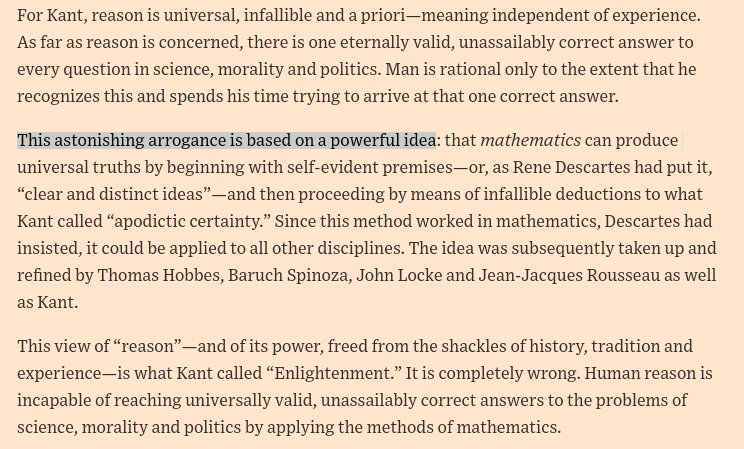
Last week, I talked about the Antifragile Framework for investing.
The biggest question, by far: What about VALUATION?
It's not in the framework.
But before I explain why, there are 6 things you need to know about ANTIFRAGILITY and PREDICTING the future. A 🧵
The biggest question, by far: What about VALUATION?
It's not in the framework.
But before I explain why, there are 6 things you need to know about ANTIFRAGILITY and PREDICTING the future. A 🧵

1/
We often take what's recently happened, and project that into the future without end.
That makes sense. 99.9% of the time, you'll be right.
The same was true for our ancestors. NOT doing this would have led to extinction as hunter-gatherers
We often take what's recently happened, and project that into the future without end.
That makes sense. 99.9% of the time, you'll be right.
The same was true for our ancestors. NOT doing this would have led to extinction as hunter-gatherers

2/
But 0.1% of the time, you'll be wrong. (Black Swans)
Imagine how WRONG your predictions would've been on:
* October 23, 1929 (Black Thursday)
* December 6, 1945 (Pearl Harbor)
* Summer 1990 (Fall of USSR)
* September 10, 2001 (9/11)
* New Year's Day 2020 (COVID)
But 0.1% of the time, you'll be wrong. (Black Swans)
Imagine how WRONG your predictions would've been on:
* October 23, 1929 (Black Thursday)
* December 6, 1945 (Pearl Harbor)
* Summer 1990 (Fall of USSR)
* September 10, 2001 (9/11)
* New Year's Day 2020 (COVID)

3/
Here's the thing: those 0.1% occurrence will account for the VAST MAJORITY of the effects moving forward.
From those dates above:
* Great Depression
* WWII
* End of Cold War
* Wars in Afghanistan/Iraq
* Pandemic
You could be right 99.9% of time & still be ILL PREPARED
Here's the thing: those 0.1% occurrence will account for the VAST MAJORITY of the effects moving forward.
From those dates above:
* Great Depression
* WWII
* End of Cold War
* Wars in Afghanistan/Iraq
* Pandemic
You could be right 99.9% of time & still be ILL PREPARED
4/
We learn:
"Wow, that was surprising!" (Hindsight)
Instead, we SHOULD learn:
"There's probably another Black Swan right around the corner." (Foresight)
Unsettling & true (note the date below)
We learn:
"Wow, that was surprising!" (Hindsight)
Instead, we SHOULD learn:
"There's probably another Black Swan right around the corner." (Foresight)
Unsettling & true (note the date below)

It need not be all doom-and-gloom.
There *are* positive Black Swans. They just develop slowly.
Imagine explaining Wikipedia to someone in 1970. Or the fact that COVID vaccines were ready so quickly.
Building good things takes time. Destroying them doesn't.
There *are* positive Black Swans. They just develop slowly.
Imagine explaining Wikipedia to someone in 1970. Or the fact that COVID vaccines were ready so quickly.
Building good things takes time. Destroying them doesn't.
5/
The same is true for companies. You cannot possibly predict what will happen in the future.
* MOATS: protect you from *negative* Black Swans
* OPTIONALITY: exposes you to *positive* Black Swans
They can't predict anything with certainty. They just tip scale in your favor
The same is true for companies. You cannot possibly predict what will happen in the future.
* MOATS: protect you from *negative* Black Swans
* OPTIONALITY: exposes you to *positive* Black Swans
They can't predict anything with certainty. They just tip scale in your favor

6/
That's why the only thing you can do is measure FRAGILITY.
We'll never know:
* When chaos will hit
* What the 2nd, 3rd order effects will be
* How quickly it will happen
But in chaos, fragile things break. Antifragile get stronger.
That's why the only thing you can do is measure FRAGILITY.
We'll never know:
* When chaos will hit
* What the 2nd, 3rd order effects will be
* How quickly it will happen
But in chaos, fragile things break. Antifragile get stronger.

That's why I don't try to predict the future.
I don't pay attention to TAM or VALUATION (more on that on Monday).
I just want to hold the companies that will do well when [X] happens -- and it WILL happen
These lessons, from @nntaleb, help me sleep well at night.
I don't pay attention to TAM or VALUATION (more on that on Monday).
I just want to hold the companies that will do well when [X] happens -- and it WILL happen
These lessons, from @nntaleb, help me sleep well at night.
If you enjoy this, consider following
@Brian_Stoffel_
I write for The Motley Fool, and often appear on Motley Fool Live
For a template of the framework, you can name the price: gumroad.com/l/zWXye
@Brian_Stoffel_
I write for The Motley Fool, and often appear on Motley Fool Live
For a template of the framework, you can name the price: gumroad.com/l/zWXye
If you want to see @BrianFeroldi and I put stocks through the Antifragile Framework, subscribe here:
youtube.com/brianferoldiyt
Already done:
$UPST
$PLTR
$CPNG
$ABNB
$COIN
$SPOT
and more
youtube.com/brianferoldiyt
Already done:
$UPST
$PLTR
$CPNG
$ABNB
$COIN
$SPOT
and more
Summary on predicting future:
1) We're right 99.9% of time
2) 0.1% we aren't (Black Swan, or BS).
3) BSs affect everything
4) BSs are ALWAYS around corner.
5) Moats protect from negative BS, optionality exposes to positive BS
6) Instead of predicting future, measure fragility
1) We're right 99.9% of time
2) 0.1% we aren't (Black Swan, or BS).
3) BSs affect everything
4) BSs are ALWAYS around corner.
5) Moats protect from negative BS, optionality exposes to positive BS
6) Instead of predicting future, measure fragility
• • •
Missing some Tweet in this thread? You can try to
force a refresh







